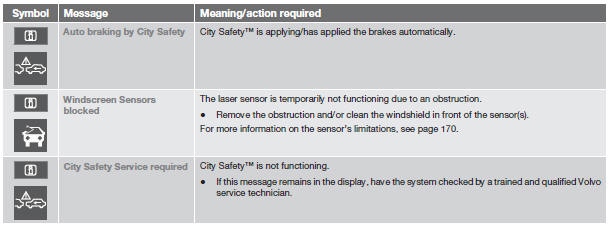Volvo S60: City Safety™
 Volvo S60: City Safety™
Volvo S60: City Safety™
- Introduction
- Function
- Using City Safety
- Limitations
- Troubleshooting
- The laser sensor
- Symbols and messages in the display
Introduction
City Safety™1 is a support system designed to help the driver avoid low speed collisions when driving in slow-moving, stop-and-go traffic.
City Safety™ is not active if your vehicle’s speed is below approximately 2 mph (4 km/h). This means that City Safety™ will not react if your vehicle approaches another vehicle at very low speed, for example, when parking.
The function is active at speeds up to approximately 18 mph (30 km/h) and assists the driver by applying the brakes automatically, thereby avoiding or helping to reduce the effects of a collision.
City Safety™ is designed to intervene as late as possible to help avoid unnecessary activation.
City Safety™ triggers brief, forceful braking if a low-speed collision is imminent. However, the system will not intervene in situations where the driver actively steers the vehicle or applies the brakes, even if a collision cannot be avoided. This is done in order to always give the driver’s actions highest priority.
City Safety™ activates in situations where the driver has not applied the brakes in time, which means that the system cannot help the driver in all situations.
City Safety™ should not be used to alter the way in which the driver operates the vehicle. The driver should never rely solely on this system to safely stop the vehicle.
Normally, the occupants of the vehicle will not be aware of City Safety™ except when the system intervenes when a low-speed collision is imminent.
If the vehicle is also equipped with the optional Collision Warning with Full Auto-brake and Pedestrian Detection system, the two systems interact. For more information about the Collision Warning with Auto-brake system, see page 173.
![]() WARNING
WARNING
- City Safety™ is a supplemental aid to the driver. It can never replace the driver’s attention to traffic conditions or his/her responsibility for operating the vehicle in a safe manner.
- City Safety™ does not function in all driving situations or in all traffic, weather or road conditions.
- City Safety™ only reacts to vehicles traveling in the same direction as your vehicle and does not react to small vehicles, bicycles or motorcycles or to people or animals.
- City Safety™ is not activated when your vehicle is backing up.
- City Safety™ functions at speeds up to 18 mph (30 km/h). This system can help prevent a collision if the difference in speed between your vehicle and the vehicle ahead is less than 9 mph (15 km/h). If the difference in speed is greater, a collision cannot be avoided but the speed at which the collision occurs can be reduced. The driver must apply the vehicle’s brakes for full braking effect.
- Never wait for City Safety™ to intervene in a potential collision situation. The driver is always responsible for maintaining a safe distance to the vehicle ahead.
Function
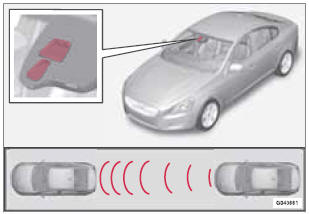
Location of the laser sensor in the windshield2
City Safety™ monitors traffic ahead of you using a laser sensor mounted in the upper section of the windshield. If a collision is imminent, City Safety™ will automatically apply the brakes, which may feel like hard braking.
If the difference in speed between your vehicle and the vehicle ahead is more than approximately 9 mph (15 km/h), City Safety™ alone cannot prevent a collision from taking place.
The driver must apply the brakes to help avoid a collision or reduce its effect.
When the function activates and applies the brakes, a message will appear in the information display to indicate that the system is/has been active.
![]() NOTE
NOTE
- When City Safety™ applies the brakes, the brake lights will illuminate.
- In cases where City Safety™ has stopped the vehicle, the system will then release the brakes. The driver must apply the brakes to keep the vehicle at a standstill.
Using City Safety
![]() NOTE
NOTE
The City Safety™ function is activated automatically each time the engine has been switched off and restarted.
On and Off
In certain situations, it may be desirable to switch City Safety™ off, such as when driving in close quarters where leaves, branches, etc. may obscure the hood and windshield.
When the engine is running, City Safety™ can be switched off as follows:
Press My Car in the center console control panel and go to Settings Car settings Driver support systems City Safety. Select Off.
If the engine is switched off, City Safety™ will reactivate when the engine is restarted.
![]() WARNING
WARNING
The laser sensor emits light when the ignition is in mode II or higher, even if City Safety™ has been switched off.
To switch City Safety™ on again:
• Follow the same procedure as for switching City Safety™ off but select ON.
Limitations
The sensor used by City Safety™ is designed to detect cars and other larger motor vehicles ahead of your vehicle in both daylight and darkness.
However, there are certain limitations and the laser sensor’s function may be reduced by, for example, heavy rain or snowfall, or by dense fog or thick, blowing dust or snow. Condensation, dirt, ice or snow on the windshield may also interfere with the sensor’s function.
Objects such as warning flags hanging from long objects on the roof or accessories such as auxiliary lights or protective arches on the front of the vehicle that are higher than the hood may also impede the sensor’s function.
Braking distance to the vehicle ahead increases on slippery road surfaces, which may reduce City Safety’s capacity to avoid a collision. In situations like this, the DSTC system (see page 149) will help provide the best possible braking capacity and stability.
City Safety™ emits infrared light and measures the way in which the light is reflected. Therefore, vehicles or objects with low-reflective surfaces may not be detected. Normally, the license plate and taillight reflectors give the rear section of a vehicle ahead sufficient reflective surfaces to be detected.
![]() NOTE
NOTE
- Keep the windshield in front of the laser sensor free of ice, snow, dirt, etc. See page 169.
- Snow or ice on the hood deeper than 2 inches (5 cm) may obstruct the sensor. Keep the hood free of ice and snow.
- Do not mount or in any way attach anything on the windshield that could obstruct the laser sensor.
Troubleshooting
If Windscreen Sensors blocked appears in the information display, this indicates that the City Safety™ laser sensor is obstructed in some way and cannot detect vehicles ahead of you, which means that the system is not functioning.
However, this message will not be displayed in all situations in which the sensor is obstructed. For this reason, the driver must ensure that the area of the windshield in front of the sensor is always kept clean.
The following table shows some of the situations that can cause the message to be displayed and suggested actions.
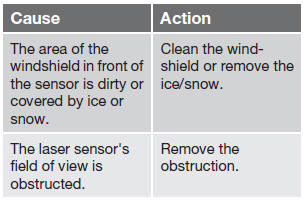
CAUTION
If a crack, scratch or stone chip should occur in the section of the windshield in front the laser sensor and covers an area of approximately 1/50 x 1/10 in. (0.5 x 3 mm) or larger, contact a trained and qualified Volvo service technician to repair or replace the windshield (see the illustration showing the location of the sensor on page 169). Failing to do so may result in reduced City Safety™ functionality.
To help prevent reduced functionality, please also observe the following:
- If the windshield is replaced, use the same type or a windshield approved by Volvo.
- When replacing windshield wipers, use the same type or ones approved by Volvo.
The laser sensor
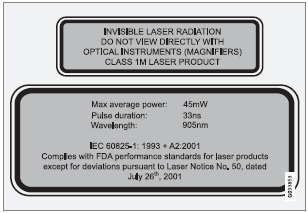
The upper decal describes the laser beam's classification and contains the following text:
Invisible Laser radiation – Do not view directly with optical instruments (magnifiers) – Class 1M laser product.
The lower decal describes the laser beam's physical data and contains the text:
IEC 60825-1:1993 + A2:2001. Complies with FDA performance standards for laser products except for deviations pursuant to Laser Notice No. 50, dated July 26th, 2001
The laser beam's physical data is listed in the following table:
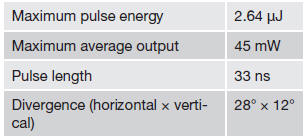
![]() NOTE
NOTE
The function of aftermarket laser detectors may be affected by City Safety's laser sensor.
![]() WARNING
WARNING
The laser sensor emits light when the ignition is in mode II or higher, even if City Safety™ has been switched off.
![]() WARNING
WARNING
Eye injury may occur if any of the following points are not followed:
- It is essential that all pertinent instructions be followed when handling laser instruments. Testing, repairing, removing, adjusting and/or replacing any components in the laser sensor may only be done by a trained and qualified Volvo service technician.
- Do not remove the laser sensor (including removal of the lenses). A laser sensor that has been removed belongs to laser class 3B according to standard IEC 60825-1. Devices in laser class 3B present a risk of injury to the eyes.
- The laser sensor’s connector must be disconnected before the sensor is removed from the windshield.
- The laser sensor must be mounted in place on the windshield before connecting the sensor’s connector.
- Do not view the laser sensor (which emits spreading, invisible laser beams) with optical instruments from a distance of less than 4 inches (100 mm).
Symbols and messages in the display
When City Safety™ automatically applies the brakes, one or more of the symbols in the main instrument panel may illuminate and its associated message will be displayed.
A text message can be erased by pressing briefly on the READ button on the turn signal lever.
